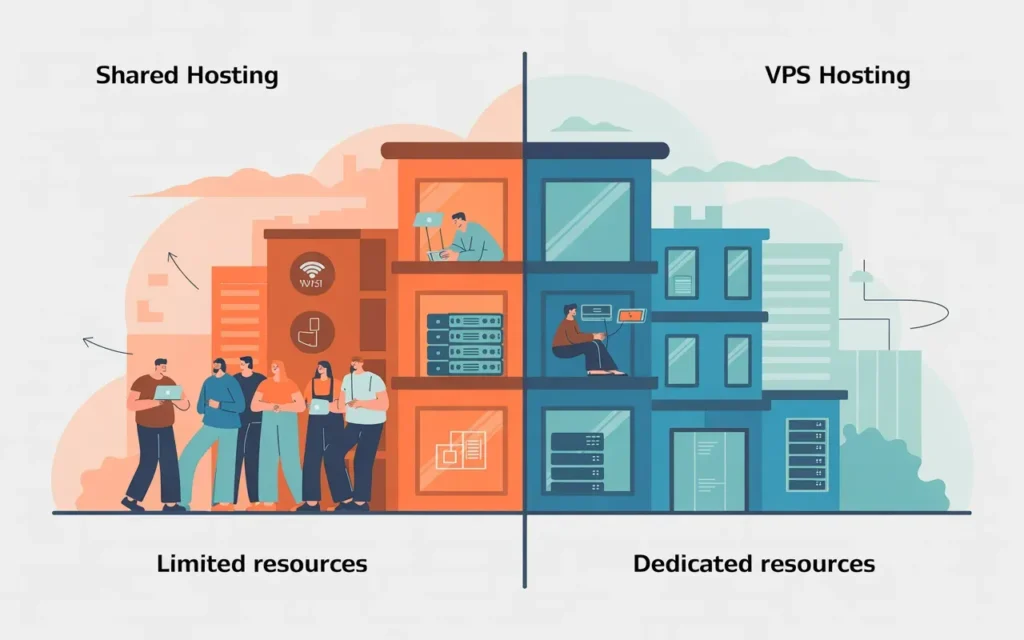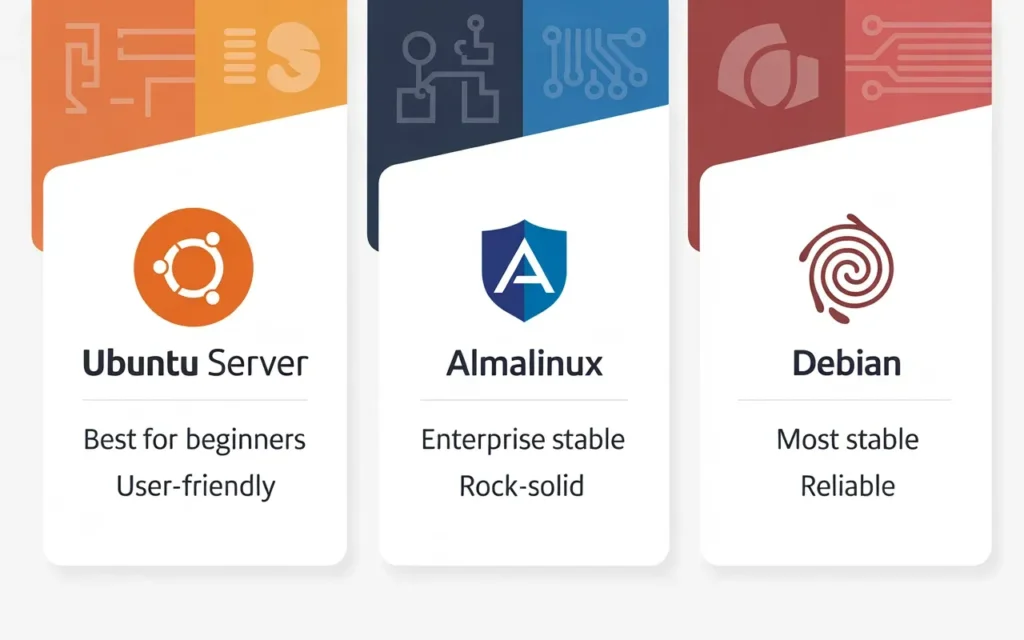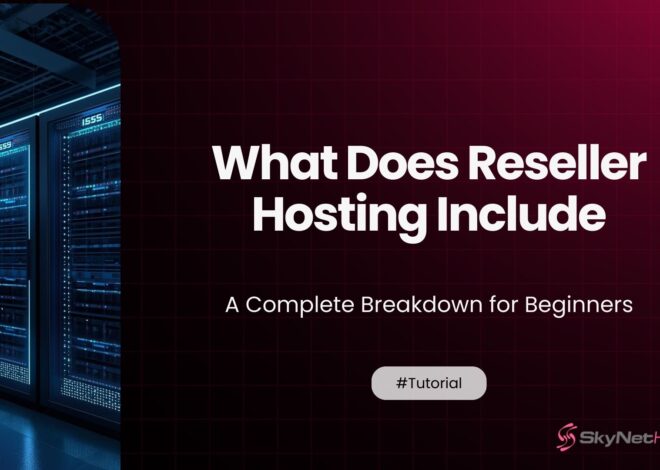
What Is Linux VPS Hosting? A Beginner-Friendly Explanation
If you’re leveling up from basic shared hosting, you’ve probably heard the term “Linux VPS hosting” thrown around. It sounds technical, and frankly, a bit intimidating if you’re not a developer. But after more than a decade in the web hosting industry, I can tell you it’s one of the most powerful and flexible solutions available – especially for growing websites and businesses.
This guide is designed to cut through the jargon. I’ll break down exactly what Linux VPS hosting is, how it works, and who it’s for. We’ll explore its benefits, compare it to other options, and look at real-world use cases. By the end, you’ll have a clear understanding of whether a Linux virtual private server is the right next step for your project.
Understanding the Basics of VPS Hosting
Before we get into the “Linux” part, let’s start with the foundation: VPS hosting.

What is a Virtual Private Server (VPS)?
Imagine a large, powerful physical server as an apartment building. In shared hosting, you and dozens of other tenants share the same apartment—you all use the same kitchen, bathroom, and living space. This is cheap, but it gets crowded, and a messy roommate can ruin the experience for everyone.
A Virtual Private Server (VPS) is like having your own condo within that building. The physical server is partitioned into multiple virtual servers, each with its own dedicated resources (CPU, RAM, and storage). You still share the building, but you have your own private, secure space. Nobody else can use your resources, and their activities won’t affect your performance. This setup gives you more power, control, and stability than shared hosting.
How VPS is different from shared hosting
The biggest difference between VPS and shared hosting comes down to resource allocation and isolation.
- Shared Hosting: You share a pool of resources with many other users. If another website on your shared server gets a massive traffic spike, it can slow down your site. You also have limited control over the server environment.
- VPS Hosting: You get a guaranteed slice of the server’s resources. Your performance is isolated from other users on the same physical machine. This means more consistent speed and reliability. You also get “root access,” which gives you complete administrative control to install software and configure the server to your exact needs.
Why businesses upgrade to VPS
Businesses and serious website owners usually upgrade from shared hosting to a VPS for a few key reasons:
- Performance: Their website has outgrown the limits of shared hosting. It’s getting more traffic and needs more power to stay fast and responsive.
- Control: They need to install custom software, run specific applications, or configure the server in a way that shared hosting doesn’t allow.
- Security: They handle sensitive data (like in an eCommerce store) and require a more secure, isolated environment to protect their customers and their business.
- Scalability: They anticipate future growth and need a hosting solution that can easily scale up resources as their traffic increases.
What Exactly Is Linux VPS Hosting?
Now, let’s add the “Linux” component. Linux VPS hosting is simply a virtual private server that runs on the Linux operating system.
Linux as the operating system
Linux is a powerful, open-source operating system, much like Windows or macOS. It’s the backbone of the internet, powering the vast majority of web servers worldwide. Its stability, security, and flexibility make it the default choice for web hosting environments. When you choose Linux VPS hosting, you are choosing to run your virtual server on this robust and widely supported platform.
How Linux VPS functions
A Linux VPS functions by using virtualization technology to create an independent server environment on a physical machine. This virtual server runs its own copy of a Linux operating system (often called a “distribution” or “distro,” like Ubuntu or CentOS).
From your perspective as a user, you interact with it just like a dedicated physical server. You can connect to it remotely, install software, manage files, and configure settings—all within your private, virtual space. The underlying Linux OS handles all the core processes, providing a stable foundation for your websites and applications.
Why Linux VPS is the most popular VPS type
Linux dominates the VPS market for several reasons. First, it’s open-source, which means it’s free to use. This significantly lowers the cost compared to Windows VPS, which requires expensive licensing fees. Second, the open-source nature means a massive global community of developers is constantly working to improve it, making it incredibly secure and stable. Finally, it supports the most common web development technologies (like PHP, MySQL, and Python) right out of the box, making it the ideal environment for developers and website owners.
Benefits of Linux VPS Hosting
Choosing a Linux VPS comes with some serious advantages, especially if you’re looking for performance, control, and value.
More control with full root access
One of the biggest benefits of Linux VPS is gaining “root access.” This is the highest level of administrative privilege on the server. With root access, you are the system administrator. You can install any software you need, customize the server environment, tweak security settings, and optimize performance. This level of control is simply not possible on shared hosting.
Better performance than shared hosting
Since your Linux VPS has its own dedicated resources (CPU, RAM, storage), you don’t have to worry about other users slowing you down. This isolation leads to significantly better and more consistent website performance. Pages load faster, and your site can handle more traffic without crashing, which is crucial for user experience and SEO.
High security with open-source architecture
The open-source nature of Linux means its code is constantly being reviewed by thousands of developers around the world. This public scrutiny helps identify and fix security vulnerabilities quickly. Linux also has a robust permissions structure that makes it inherently more secure than other operating systems. With a Linux VPS, you can implement advanced security measures like custom firewalls and SSH key authentication to further protect your server.
Cost-effective compared to Windows VPS
Because Linux is free, hosting providers don’t have to pay licensing fees to Microsoft. They pass these savings on to you, making Linux VPS hosting plans significantly more affordable than their Windows counterparts. For most websites and applications, which don’t require specific Windows software, Linux offers the best balance of power and price.
Popular Linux Distributions for VPS Servers
When you sign up for a Linux VPS, you’ll need to choose a “distribution.” Here are some of the most popular choices:

Ubuntu Server
Ubuntu is arguably the most popular and user-friendly Linux distribution. It has a huge community, extensive documentation, and a massive repository of pre-built software packages. This makes it an excellent choice for beginners and experienced users alike. It’s known for its regular release cycle and long-term support (LTS) versions.
CentOS / AlmaLinux
CentOS has long been a favorite in the enterprise world for its stability and security. It is based on Red Hat Enterprise Linux (RHEL), a commercial-grade OS. Since CentOS shifted its focus, AlmaLinux has emerged as its spiritual successor, offering a free, stable, and 1:1 binary-compatible alternative to RHEL. It’s a rock-solid choice for production servers.
Debian
Debian is one of the oldest and most respected Linux distributions. It is known for its commitment to free software and its extreme stability. Ubuntu is actually based on Debian. While its software packages can sometimes be slightly older (prioritizing stability over cutting-edge features), it’s a fantastic, reliable option for running a web server.
Which Linux distro you should choose
For most people, Ubuntu Server is the best place to start. Its ease of use and vast community support make it the most accessible option. If your priority is long-term stability for a business-critical application, AlmaLinux is an excellent choice. If you’re a purist who values stability above all else, you can’t go wrong with Debian. Ultimately, the choice often comes down to personal preference and your specific needs.
Managed vs Unmanaged Linux VPS Hosting
Another key decision is whether you want a managed or unmanaged service.
What unmanaged Linux VPS means
With unmanaged Linux VPS, the hosting provider is responsible for the physical hardware and network connectivity. You are responsible for everything else: installing the OS, setting up the web server software, configuring security, performing updates, and troubleshooting any issues. This option gives you maximum flexibility but requires significant technical expertise and time. It’s best suited for experienced developers and system administrators.
Who needs managed Linux VPS
Managed Linux VPS is for users who want the power of a VPS without the headache of managing it. The hosting provider takes care of all the server administration tasks, including security patches, software updates, and technical support. This lets you focus on building your website or running your business. It’s the perfect choice for small business owners, designers, and anyone who isn’t a Linux expert.
Evaluating which option fits your skills
Be honest about your technical skills and the amount of time you can commit. If you’re comfortable working in the command line, configuring firewalls, and troubleshooting server errors, unmanaged hosting can save you money. If you’d rather have an expert team handle the technical side so you can focus on your work, the extra cost of managed hosting is well worth the investment.
What Can You Do With a Linux VPS?
A Linux virtual private server is a blank canvas. Here are just a few things you can do with it:
Host websites and applications
This is the most common use. A Linux VPS can easily host multiple websites, high-traffic blogs, or resource-intensive web applications. You have the freedom to install the exact software stack you need (e.g., LAMP or LEMP) and optimize it for performance.
Run eCommerce stores
eCommerce sites require higher levels of security and performance to handle transactions and protect customer data. The isolated environment of a Linux VPS is ideal for hosting platforms like Magento or WooCommerce, ensuring your online store is fast, reliable, and secure.
Build development/testing environments
Developers love Linux VPS for creating sandboxed environments. You can set up a server to mirror your production environment, allowing you to test new features, debug code, and run experiments without affecting your live website.
Create custom software setups
Need to run a game server, a VPN, a private cloud storage solution, or a custom piece of software? A Linux VPS gives you the freedom and root access to install and configure virtually anything you can imagine.
How Secure Is Linux VPS Hosting?
Linux has a well-deserved reputation for being highly secure, and a VPS environment allows you to take that security to the next level.
Firewall and antivirus tools
With a Linux VPS, you can install and configure powerful firewalls like iptables or UFW (Uncomplicated Firewall) to control incoming and outgoing traffic. You can also install security tools like ClamAV to scan for malware, although viruses are much less of a concern on Linux than on Windows.
SSH and key-based authentication
Secure Shell (SSH) is the standard for securely connecting to and managing a Linux server. For even stronger security, you can disable password-based logins and use SSH key-based authentication. This method is virtually immune to brute-force attacks, as it requires a private cryptographic key to gain access.
Why Linux is considered safer
Linux’s security stems from its UNIX-like architecture, which enforces a strict permissions model. Regular users do not have permission to modify critical system files, which contains malware and prevents accidental damage. Its open-source nature also means that vulnerabilities are typically found and patched much faster than in closed-source systems.
How Linux VPS Differs from Windows VPS
While Linux is more popular, Windows VPS has its place. Here’s a quick comparison.
Performance comparison
In general, Linux is lighter and more efficient than Windows. It requires fewer system resources to run, which means more of your server’s CPU and RAM can be dedicated to your applications. For most web-related tasks, a Linux VPS will deliver better performance than a Windows VPS with the same specifications.
Cost difference
This is a major differentiator. Linux is free, while Windows Server requires a license, which can add a significant cost to your monthly hosting bill. If you don’t need to run Windows-specific software, choosing Linux is a simple way to save money.
Which one to choose for your use case
The choice is usually straightforward:
- Choose Linux VPS if: You are building websites with PHP, Python, Ruby, or Node.js; using databases like MySQL or PostgreSQL; or running popular applications like WordPress or Magento.
- Choose Windows VPS if: You need to run applications built on Microsoft technologies, such as ASP.NET, MS SQL Server, or Exchange.
For over 95% of use cases, Linux VPS is the right choice.
Why Linux VPS Hosting Is Ideal for Small Businesses and Developers
For small businesses and developers, Linux VPS hosting hits the sweet spot of power, control, and affordability.
Flexibility and customization
As a developer, you have the freedom to build the exact environment you need. As a small business owner, you have a platform that can be tailored to your unique requirements, whether you’re hosting a website, running an application, or managing a database.
Affordable pricing
Linux VPS plans provide a massive step up in performance from shared hosting without the huge financial jump to a dedicated server. This makes it an accessible option for businesses and individuals on a budget who still need professional-grade hosting.
Scalable resources
With a Linux VPS, you can start small and easily upgrade your resources (CPU, RAM, storage) as your website or application grows. This scalability means you only pay for what you need, and your hosting can grow alongside your success.
Why Skynethosting.net Is a Good Choice for Linux VPS Hosting
When you’re ready to make the leap to Linux VPS, choosing the right provider is critical. Skynethosting.net offers a compelling package for several reasons.
Affordable Linux VPS plans
Skynethosting.net provides competitively priced Linux VPS plans that deliver excellent value. Their pricing structure makes it affordable for small businesses and developers to access the power and control of a virtual private server.
Global data centers
Having your server physically closer to your audience reduces latency and improves loading speeds. With data centers in 25 worldwide locations, Skynethosting.net allows you to choose a server location that is optimal for your target market, whether it’s in the USA, Europe, or Asia.
Reliable uptime and performance
Backed by over 20 years in the business, Skynethosting.net has a proven track record of reliability. They use modern hardware, including NVMe SSDs, which are significantly faster than traditional SSDs, and LiteSpeed Web Server to ensure your site is fast and responsive. They stand by their infrastructure to deliver consistent performance and uptime.
Final Thoughts: Is Linux VPS Right for You?
Let’s bring it all together.
Summary of what Linux VPS hosting is
Linux VPS hosting provides you with a private, secure, and powerful virtual server that runs on the highly stable and efficient Linux operating system. It offers dedicated resources, root access, and a significant performance boost over shared hosting, all at an affordable price.
Key reasons to choose Linux VPS
You should choose Linux VPS hosting if you need more performance, security, and control than shared hosting can offer. It’s the perfect solution for growing websites, eCommerce stores, custom applications, and development environments. Its cost-effectiveness, scalability, and robust open-source ecosystem make it the go-to choice for the majority of web projects.
Final guidance based on user skill level
- For Beginners & Business Owners: If you’re not a technical expert, a managed Linux VPS is your best bet. It gives you all the power without the management overhead.
- For Developers & System Admins: If you’re comfortable with the command line and want full control, an unmanaged Linux VPS offers ultimate flexibility and savings.
Stepping up to a Linux VPS is a major milestone in your online journey. It’s a sign of growth and a commitment to providing a better, faster, and more secure experience for your users.



